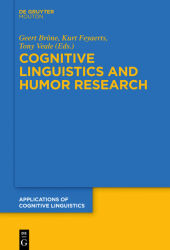 Neuerscheinungen 2017Stand: 2020-02-01 |
Schnellsuche
ISBN/Stichwort/Autor
|
Herderstraße 10
10625 Berlin
Tel.: 030 315 714 16
Fax 030 315 714 14
info@buchspektrum.de |

Geert Brône, Kurt Feyaerts, Tony Veale
(Beteiligte)
Cognitive Linguistics and Humor Research
Herausgegeben von Brône, Geert; Feyaerts, Kurt; Veale, Tony
2017. 230 mm
Verlag/Jahr: DE GRUYTER; DE GRUYTER MOUTON 2017
ISBN: 3-11-055397-X (311055397X)
Neue ISBN: 978-3-11-055397-0 (9783110553970)
Preis und Lieferzeit: Bitte klicken
Honorary editor: René Dirven The series Applications of Cognitive Linguistics (ACL) welcomes book proposals from any domain where the theoretical insights developed in Cognitive Linguistics (CL) have been (or could be) fruitfully applied. In the past thirty-five years, the CL movement has articulated a rich and satisfying view of language around a small number of foundational principles. The first one argues that language faculties do not constitute a separate module of cognition, but emerge as specialized uses of more general cognitive abilities. The second principle emphasises the symbolic function of language. The grammar of individual languages (including the lexicon, morphology, and syntax) can be exclusively described as a structured inventory of conventionalized symbolic units. The third principle states that meaning is equated with conceptualization. It is subjective, anthropomorphic, and crucially incorporates humans´ experience with their bodies and the world around them. Finally, CL´s Usage-Based conception anchors the meaning of linguistic expressions in the rich soil of their social usage. Consequently, usage-related issues such as frequency and entrenchment contribute to their semantic import. Taken together, these principles provide researchers in different academic fields with a powerful theoretical framework for the investigation of linguistic issues in the specific context of their particular disciplines. The primary focus of ACL is to serve as a high level forum for the result of these investigations.
To what extent can Cognitive Linguistics benefit from the systematic study of a creative phenomenon like humor? Although the authors in this volume approach this question from different perspectives, they share the profound belief that humorous data may provide a unique insight into the complex interplay of quantitative and qualitative aspects of meaning construction.
G. Brône, Lessius University College, Antwerpen; K. Feyaerts, Katholieke Universiteit Leuven; T. Veale, University College Dublin.


